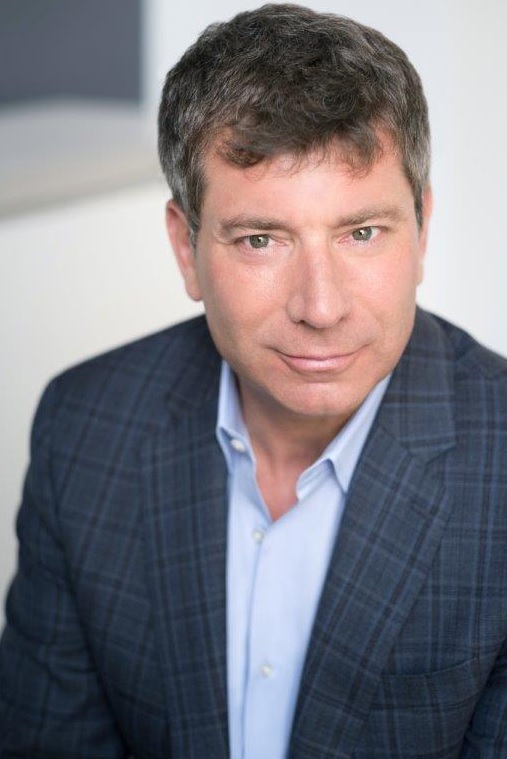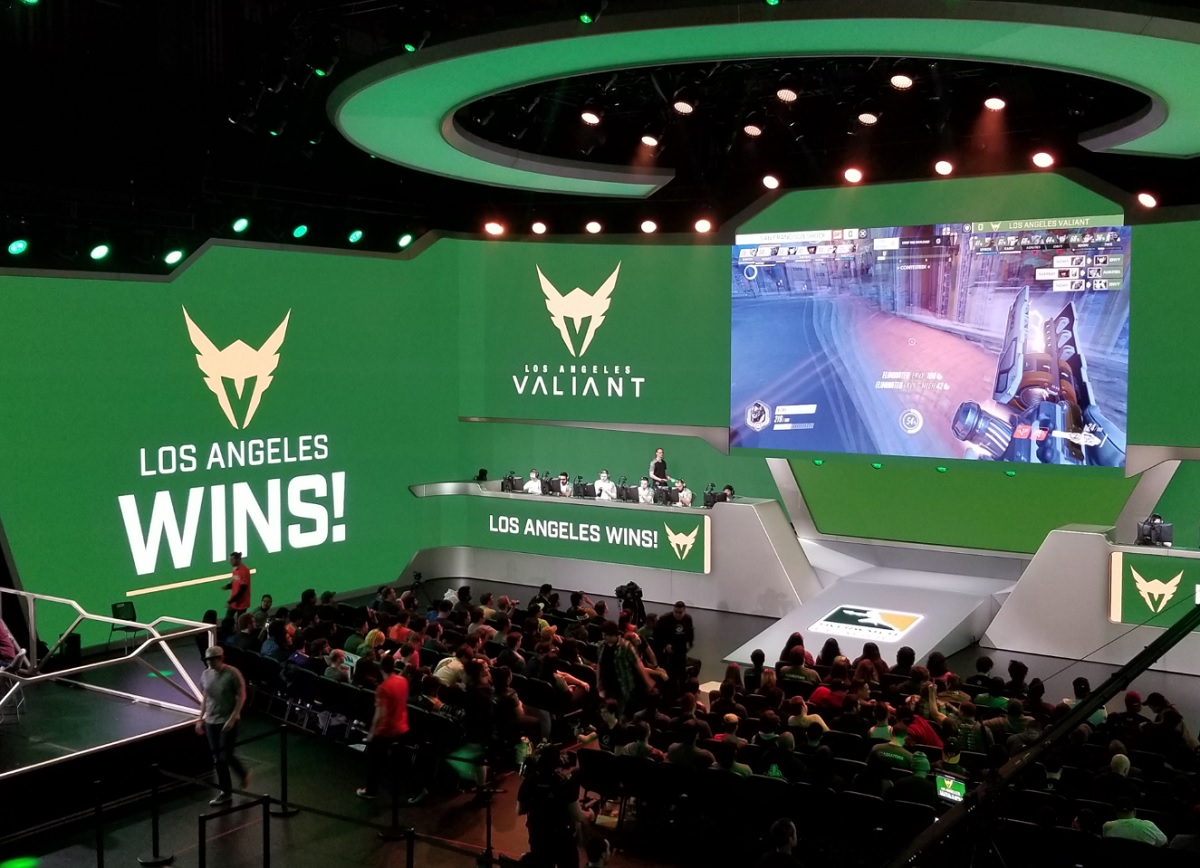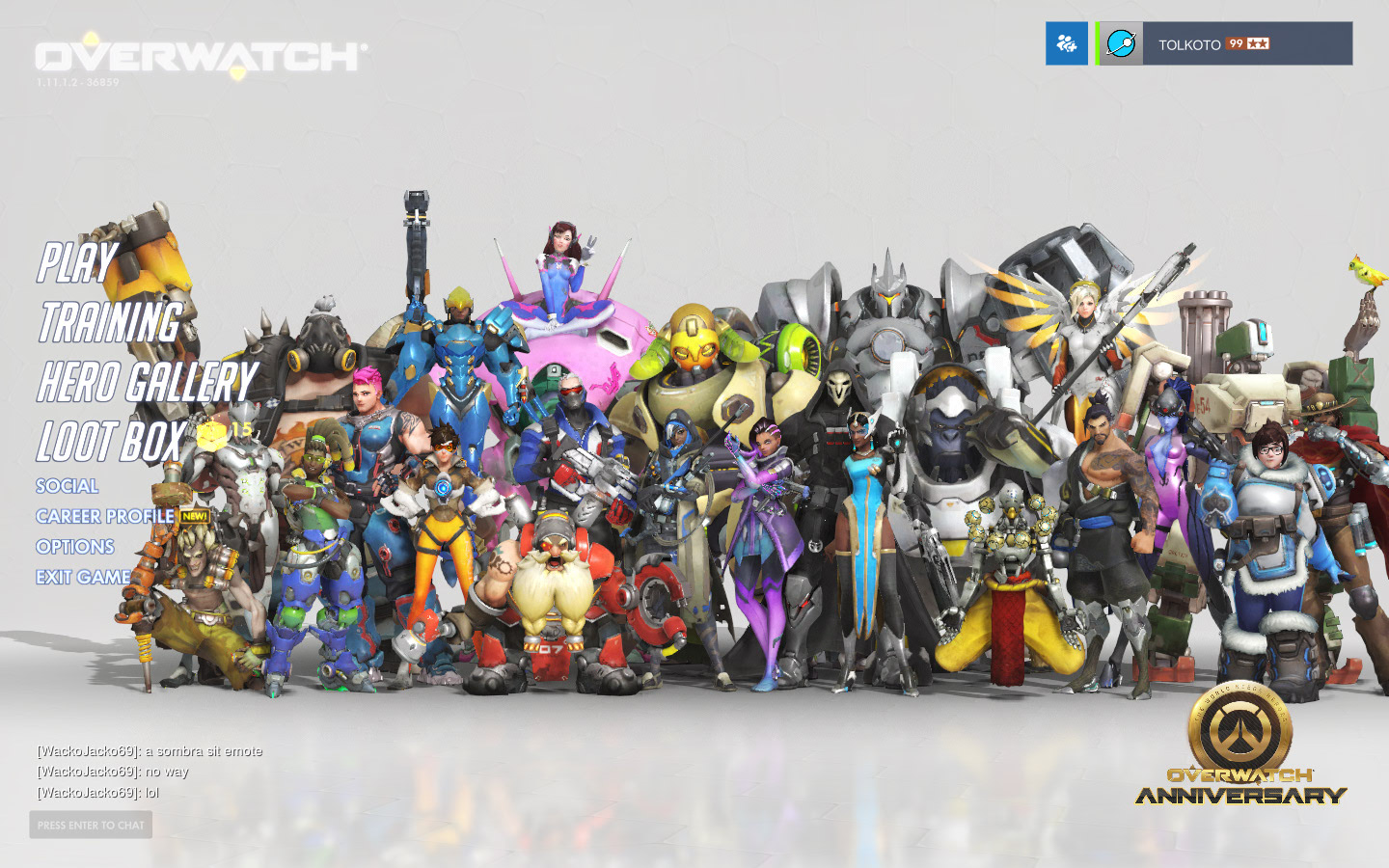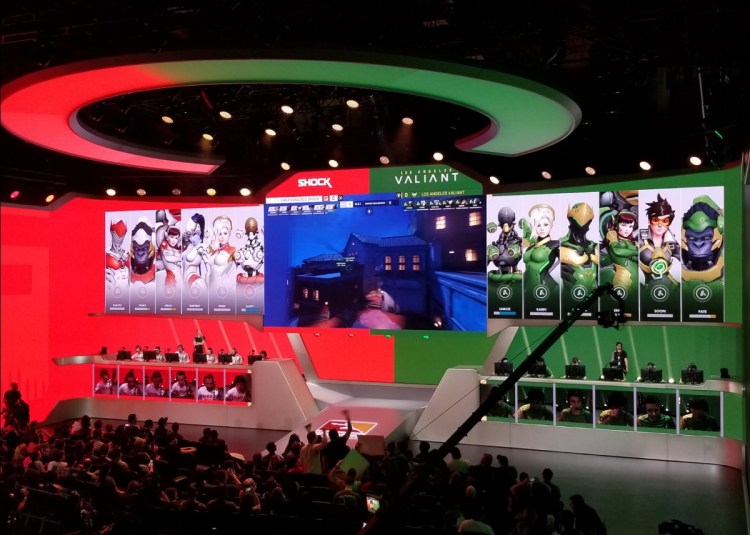The Overwatch League (OWL) had a great debut a couple of weeks ago, with more than 10 million viewers tuning in during the first week of the inaugural esports league featuring Blizzard’s Overwatch first-person shooter game.
One of the early believers in esports was Peter Levin, president of interactive ventures, games, and digital strategy at Lionsgate. He invested in Immortals — the Los Angeles esports team, which created a new team, LA Valiant, to participate in the Overwatch League. Lionsgate also invested in Immortals/LA Valiant. Activision Blizzard sold the Overwatch League franchises for an estimated $20 million, and it gave each franchise owner a region as part of a worldwide geographic competition.
Market researcher Newzoo estimates that esports will become a $1.5 billion to $2.5 billion business by 2020.
With Levin, Lionsgate has become active not only in esports, but video game licensing, game-startup investments, and virtual reality experiences as well. I spoke with Levin about his impressions of the Overwatch League, running an esports team, and the larger prospects for esports.
June 5th: The AI Audit in NYC
Join us next week in NYC to engage with top executive leaders, delving into strategies for auditing AI models to ensure fairness, optimal performance, and ethical compliance across diverse organizations. Secure your attendance for this exclusive invite-only event.
Here’s an edited transcript of our interview.

Above: Peter Levin is president of interactive ventures, games, and digital strategy at Lionsgate.
GamesBeat: You saw the numbers, about 10 million views?
Peter Levin: Yeah, I’m neck deep with these guys, on the line with them regularly. I couldn’t be more pleased with the first bucket of data we’ve seen.
GamesBeat: Did that strike you in any way, where people might have been coming from? There had to be a lot of overseas viewers.
Levin: I’ve not yet seen the breakdown of the markets. I will say — one, and say this a lot to my team, probably one of the hardest things to do in media, including gaming, is to launch a globally successful video game. Probably harder than launching a blockbuster film franchise. It takes longer to develop. It’s exponentially more expensive. It’s a commitment of hundreds of people deploying against a discrete product. If you’re able to do that, launch a successful esports title — only a handful have risen above the noise the way games like Dota 2, Counter-Strike, Overwatch, and League have been able to do.
That’s a completely separate discipline from launching a successful 21st-century league, and that’s what Activision Blizzard has done. That, to me, is extremely impressive as an owner within the league. The level of commitment, dedication, and professionalism these guys have deployed against this, from the top down — that’s my other point. From the first meeting we had in Overwatch, [Activision Blizzard CEO] Bobby Kotick was in the room. The first followup phone call we had with Activision Blizzard, Bobby was on the call. At the first owners’ meeting, Bobby greeted everyone at the door with a handshake and stayed for the duration of a nine-hour meeting.
At our first match last week, where I brought a gaggle of senior Lionsgate executives to be exposed to this for the first time, the first words out of Bobby and his team were, “What can we be doing better for the owners? What should we [be] doing going forward to make this product better?” That’s been the attitude since day one, and I think that’s what’s led to this early traction.
GamesBeat: How did you find the spectator experience?
Levin: It was incredibly energetic. Myself, probably like you, I’ve been to more esports events than most people that were in attendance. But the level of detail around the screens, the gravitas that was created with the teams up on the dais the way they were, the enthusiasm of the crowd, and the knowledge of the crowd about the game, the subtleties and nuances of the game, created a great competitive gaming experience.
The amount of energy around — I couldn’t even buy something at the gift shop before our match because the line was too long, and I didn’t want to miss anything. I thought that was a great bellwether of things to come. But again, I think it’s the quality of the executives and the level of executive acumen that they’re deploying against this. It’s great for the entire industry. They’re setting the bar very high.

Above: LA Valiant team at the Overwatch League.
GamesBeat: How did the Immortals/LA Valiant do?
Levin: We’re the LA Valiant now, which is part of Immortals. Blizzard wanted all of these teams to be named independently from the names they compete under in other games, so we’re the LA Valiant. We’re 2-0 right now, so we’re off to a good start, but the competition is heady. You’ve got a lot of commentary out there about which teams are in a leadership position.
For me, it’s much too early to tell, but the second round of matches against Dallas were nail-biters. The score might not indicate it, but we were all on the edge of our seats. I think the parity of competition is great. The localization, the city-based teams, that’s clearly generated a whole new level of local engagement and fan bases. If you read some of the things that the Kraft family, Robert and Jonathan Kraft have had to say, it’s the first global launch of a league. It’s one of the first opportunities to do something like this because of the global nature of esports.
For us, I can’t imagine being an esports team owner in Los Angeles, with partners like AEG, arguably one of the most accomplished sports asset ownership groups in the world, and Mike Milken, who touches every corner of media and has the definitive global conference in here in Los Angeles every year — having AEG as a partner and eventually being able to leverage that footprint down at L.A. Live, where they own the Staples Center and the Microsoft Theater, multiple venues surrounded by demographics that map incredibly well onto an esports audience.
Coupling that to all that Mike Milken brings to the table and Lionsgate being a forward-leaning media company — we were the first of the studios to jump into the fray. Now, you have both Comcast and Disney in ownership positions, which is fantastic. But yes, if you’re going to activate in L.A. with sports, entertainment, live events business, we have about as strong a partnership as we could ask for.
https://www.youtube.com/watch?v=ga18GQ5INsw
GamesBeat: What reactions did you get from your fellow executives who aren’t necessarily game people?
Levin: They were incredibly excited about what they saw. Strategically, I was able to put some of the Immortals and Valiant executives close enough to answer a bevy of questions relative to what exactly they were watching. But what they did get was the level of energy in the room. You have 500 screaming fans. You have just a beautiful presentation with the enormous screen they have. You have approachable commentators that aren’t speaking above anybody. They make the broadcast more approachable to those that are learning the game, even if it’s your first time seeing esports competition.
What they really get, since they’re media executives, are the numbers. When you read about Twitch and the economics around that two-year deal or when you read about global sponsorship partners like HP and Intel and more to come — then, you get the forensic analysis of week one. This is the first week, the inaugural week of the inaugural season of the Overwatch League, and the numbers are what they are. Nobody is going to look sideways at those metrics.
GamesBeat: What do you think needs to happen going forward? How can they sustain the attention?
Levin: Well, the game is growing. There’s data to support that. If you don’t have a game that competes at the level of the top four or five games, we’re not even having this conversation. The game continues to grow. What they’ve done well and I can speak on behalf of Immortals and Valiant — we’re three years in this market, and I think operationally, we have done as good a job as anyone in North America on pretty much any measurable index with respect to operations. That’s not just competition, right? That’s social outreach, content generation, fan engagement.
What Bobby and his team have done, top down, is seek out the best operators. That’s what we do. We operate. Bobby realized there’s enough riding on this that he was going to be personally involved, as I mentioned. He’s not delegating two or three rungs down the ladder. He’s empowering his executives. Most important, and this is something we learned from day one, they are very desirous of collaboration with their ownership. They’re clearly in some new territory as Activision Blizzard, and so, when you have owners like the Krafts, or like the Wilpons, or AEG, Mike Milken, and Lionsgate, there are clearly going to be relationships within the industry that we can bring to the table. Instead of the “not invented here” perspective, they’ve been extremely collaborative, leaning into cooperation with ownership, which is great.
GamesBeat: As far as parallels, the idea that esports can be as big as traditional sports, what are you looking forward to on that front?
Levin: Rather than look at it as this is the demise of traditional sports, I really do think this is a completely different animal. Other than soccer, and to a degree martial arts, esports is probably one of the only competitive activities that truly ports globally. It happens to appeal to both the most coveted and elusive of demographics. That makes it even more attractive to brands and marketers, particularly global ones. Yes, there will be some facets and assets of traditional sports that will apply. But I also think it’s a bit of a brave new world.
Even when you look at the distribution relationships that Activision Blizzard put in place from [the] go in markets like China and Korea and with Twitch, it has felt global from day one. When you have teams from Shanghai and Seoul and London, it’s felt global from day one. Those teams are not peripheral or subordinate to the New Yorks and L.A.s. In fact, Seoul is probably one of the most feared and respected franchises out there. That’s a good thing.
I just think it has this global orientation from day one. That’s been the in the DNA of esports for years and years. Fortunately, with a partner in Activision Blizzard — they’ve been a global business for decades. They’ve thrived in markets that have been tough to penetrate for traditional sports and traditional media. They haven’t had those same issues.

Above: LA Valiant at the Overwatch League.
GamesBeat: How do you feel about the investment in esports teams? There are some people who’ve said that maybe the better investments will be in startups around the infrastructure, something like that.
Levin: We’re investors in Mobcrush, which is live streaming for mobile gaming. We were the only media company that invested in the early rounds. We’ve invested in original content, both scripted and unscripted, around esports. You’ll be hearing more about that. But I think anybody who — it’s the first pitch of the first inning of a nine-inning game with esports. I feel fantastic about our investment in Immortals and Valiant, particularly in light of the early metrics from Activision.
Will there be bumps in the road? Absolutely. Will there be course corrections in the marketplace? Absolutely. If you’re this for a short, get in and get out, it’s the shiny new toy, this may not be your thing. But that’s not our perspective. We’ve already done several cooperations between Lionsgate and the Valiant and Immortals, everything from promoting private screenings of The Commuter — watch it with the LA Valiant in our screening room — to jersey representation for upcoming releases of films and TV shows, to having the teams attend worldwide premieres and leveraging their social media footprints and getting that messaging out to a very desirable demographic. We have original content opportunities as well.
I see it as very early days. I’m not at all skeptical. If we have a drop of cynicism or skepticism, we wouldn’t have done this. But it’s not a sprint. It’s a marathon. What Bobby and his team have done is put a major foundational block in place and set that bar very high. That’s great for the entire industry. We see there’s plenty of room for multiple winners. Whether that’s on the casual side or on the mid-core side, whether it’s existing titles that have been around a long time like Dota 2 and Counter-Strike [or] emerging titles like Overwatch. At the end of the day, it’s a relatively new game, and look what it’s been able to do.
GamesBeat: How would you compare something like Overwatch or [PlayerUnknown’s Battlegrounds] to Counter-Strike in that respect?
Levin: When you look at games like [PlayerUnknown’s Battlegrounds] and Fortnite, it’s just phenomenal what those titles have been able to do. That being said, they appeal to a more hardcore audience. Just because of the nature of the games, you’re going to also appeal to different distributors and brands and marketers. More than likely, because of the more family-friendly nature of Overwatch, the diversified characteristics of the characters — gender and body type and more — it affords us a broader portfolio of prospective partnerships. But what Counter-Strike has been able to do internationally for years in the esports scene — in their own way, they set the bar very, very high.
GamesBeat: Are there any other sorts of investments that might also be distracting in some way, other investment categories of interest?
Levin: For us right now, we have a nice portfolio of companies that we’re working with on the investment side and on the development and production side. Since I began at Lionsgate, we’re now creeping up to 40 projects in various forms of production and development and in the wild. We have a pretty full slate. Esports is just going to be a welcome addition to the business as a whole. It appeals to so many parts of our business — content, intellectual property, location-based entertainment.
We have AEG as a partner. This is a company that does hundreds of millions of dollars in sales of sponsorship and advertising. They own the Staples Center. They own the Kings and the Lakers. You can tell that their sponsorship and ad-sales guys are very fired up about playing with this brand new inventory. They’re working hand in hand with us to put those relationships in place.
We have this fun new thing to work with that’s garnering a tremendous amount of attention but also traction. That’s the key. If this thing came out and kind of tapered off, there would be much less enthusiasm to deploy against it the way everyone has.
I want to impress on you again how impressed we have been with Bobby Kotick and the whole team at Activision Blizzard. Not that we’ve been surprised because no other publisher fires on all cylinders the way they do. Whether it’s console, mobile, PC, or now esports, you can’t count those guys out.

Above: The Overwatch cast.
GamesBeat: What else would you like to say?
Levin: What Bobby and his team have crystalized is the very discreet difference between the publishing of a global sensation, competitive esports gaming title — which is perhaps, one of the hardest things to do in media — and the standing up of a 21st century, next-generation competitive league. Overwatch has achieved that rarified air of the first criteria while Activision Blizzard has simultaneously defined what it means to operate a world-class esports league.
Operators operate. Bobby was in our very first meeting on Overwatch League, was on every follow up call, was at the door greeting every owner at our first owner’s meeting, and has hired a team of executives around him with the highest levels of sport, live events, and gaming acumen and DNA. No delegation going on at OWL, and it shows in the quality of the product.
With major shareholders like AEG, Michael Milken, and Lionsgate, the idea that we can interact and inter-operate principal to principal is game changing with Activision Blizzard. Bobby has built a culture and structure that has the league, his publishing engine, and the owners working hand in hand with aligned interests.
And Wednesday’s match of the Los Angeles Valiant vs. the LA Gladiators (owned by the L.A. Rams owner Stan Kroenke) is being talked about as one of if not the most competitive Overwatch League matches having taken place thus far. Starting off with a 0-2 score, the LA Valiant roared back with a reverse sweep to claim a 3-2 victory.
The match was absolutely bananas, and the Twitch numbers were increasing during the last 30 minutes of a 6-hour broadcast.


